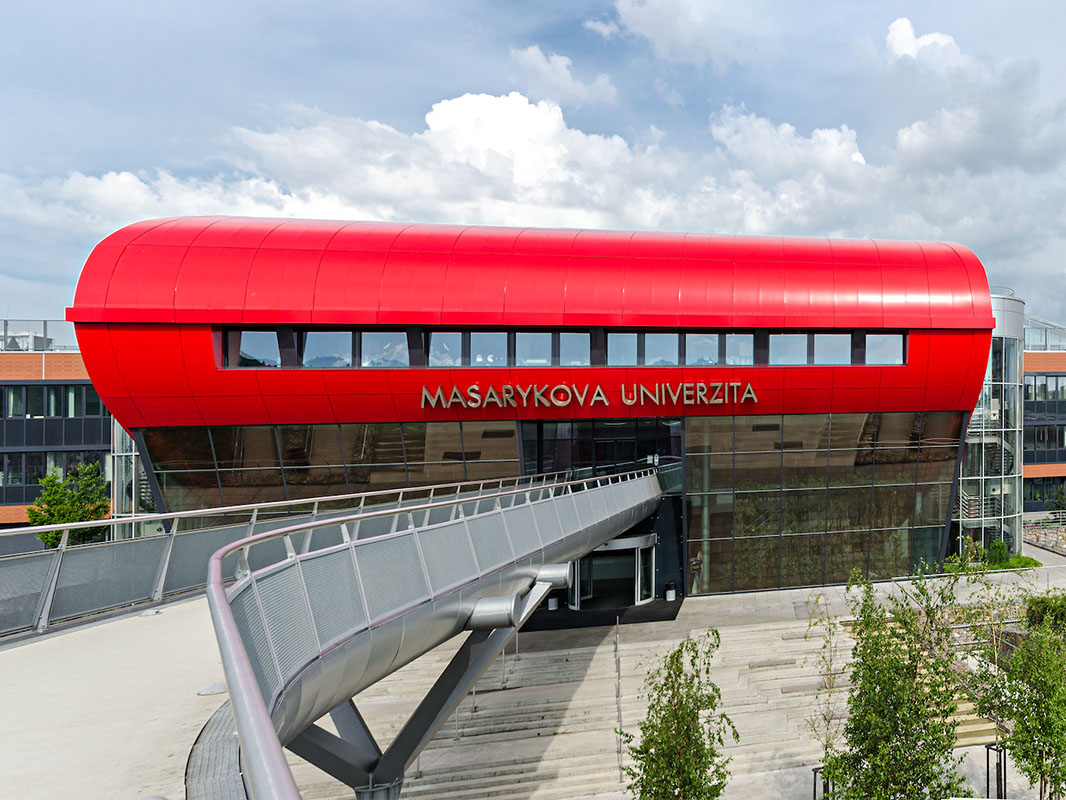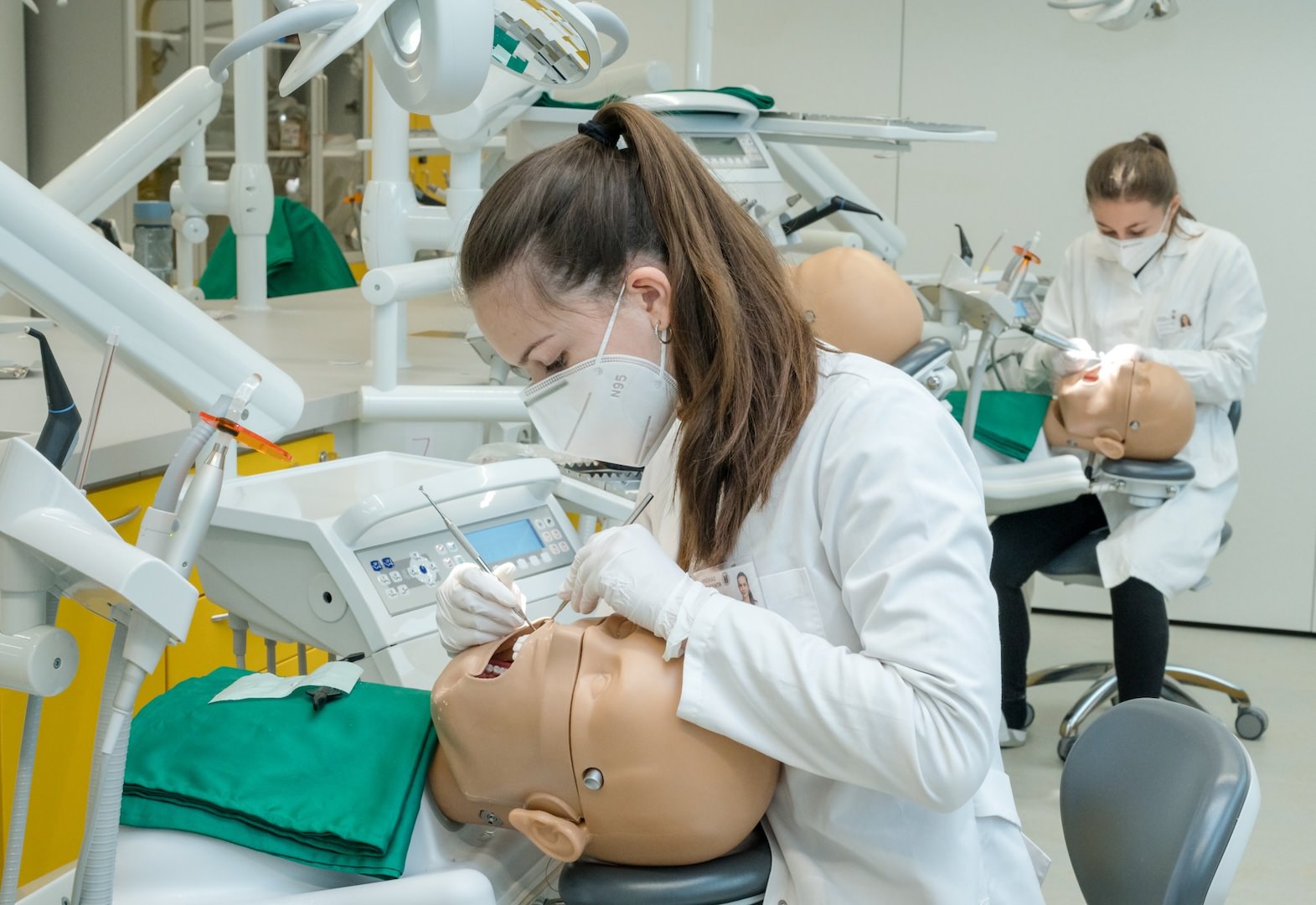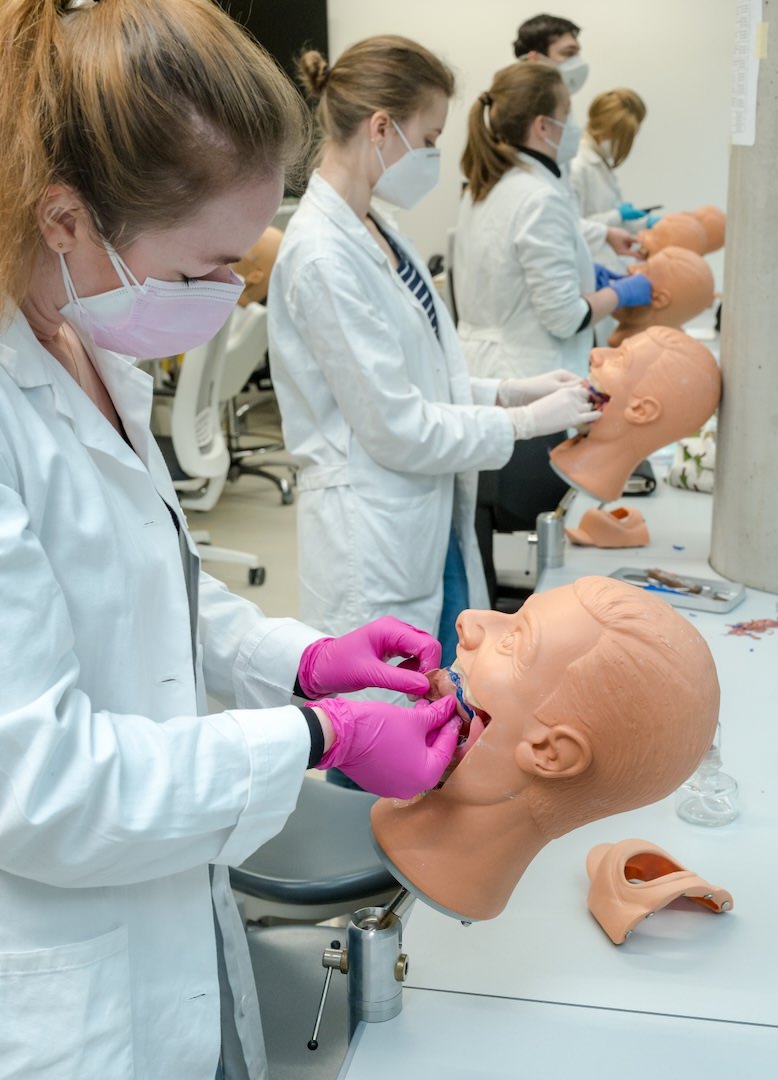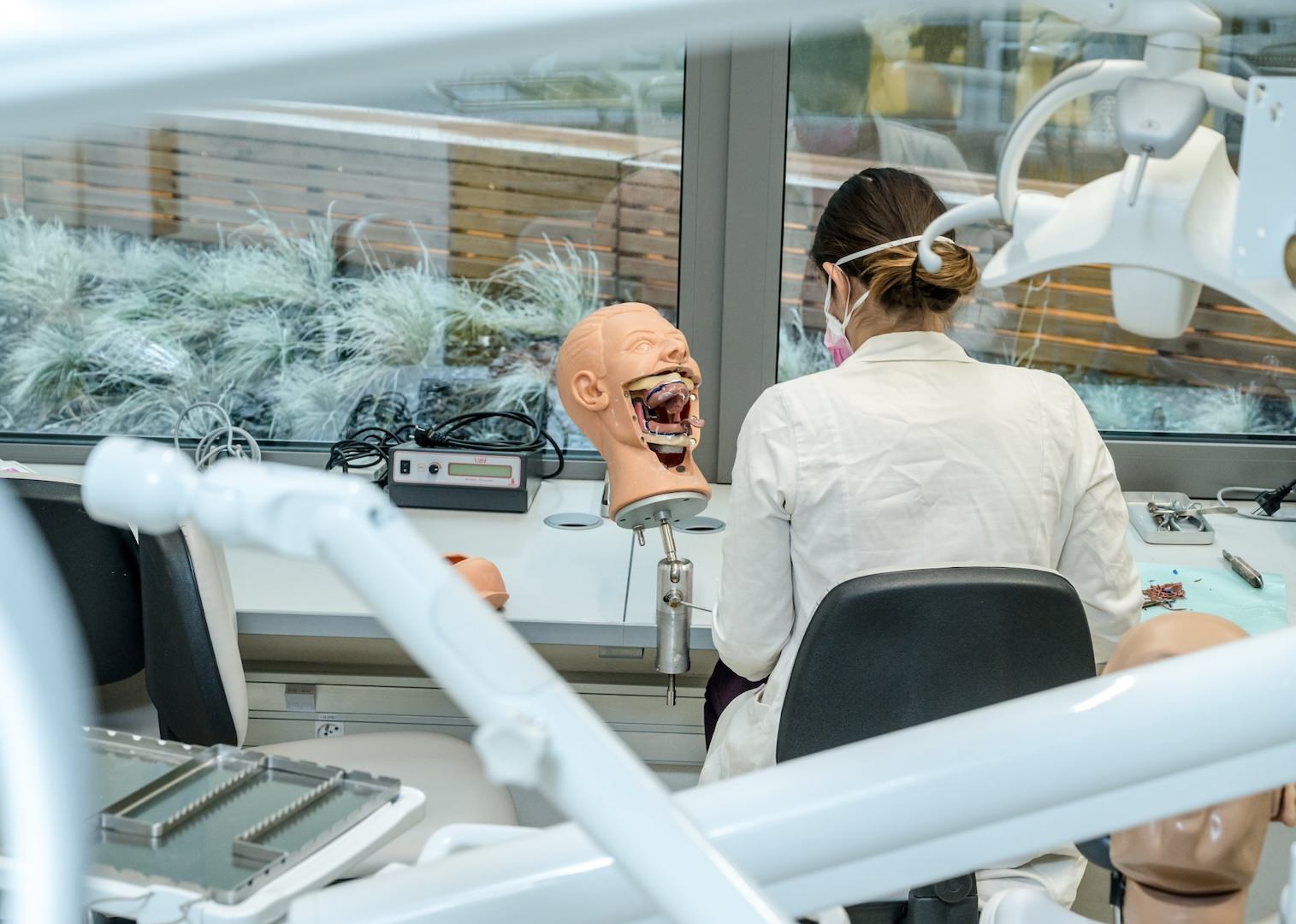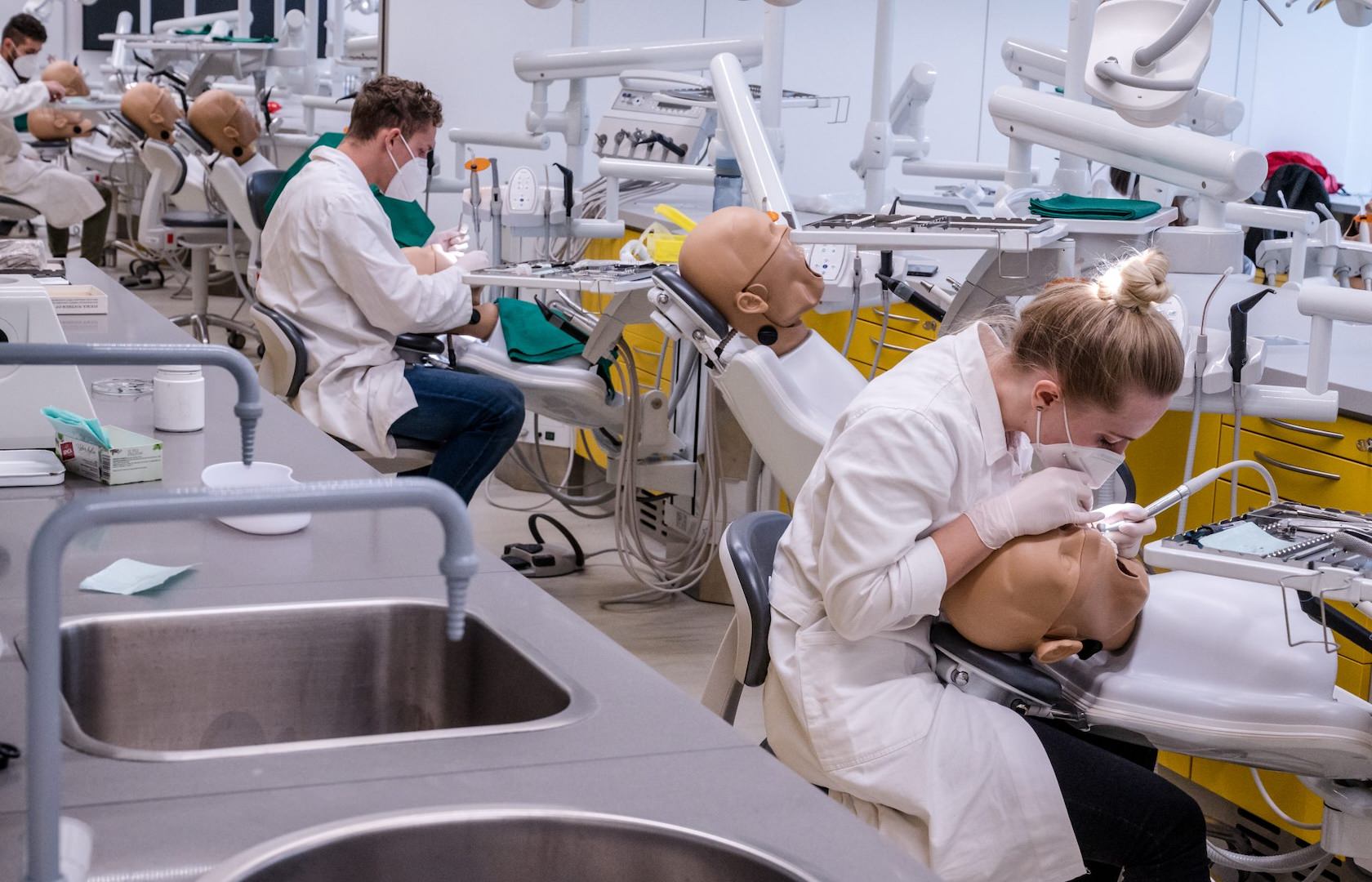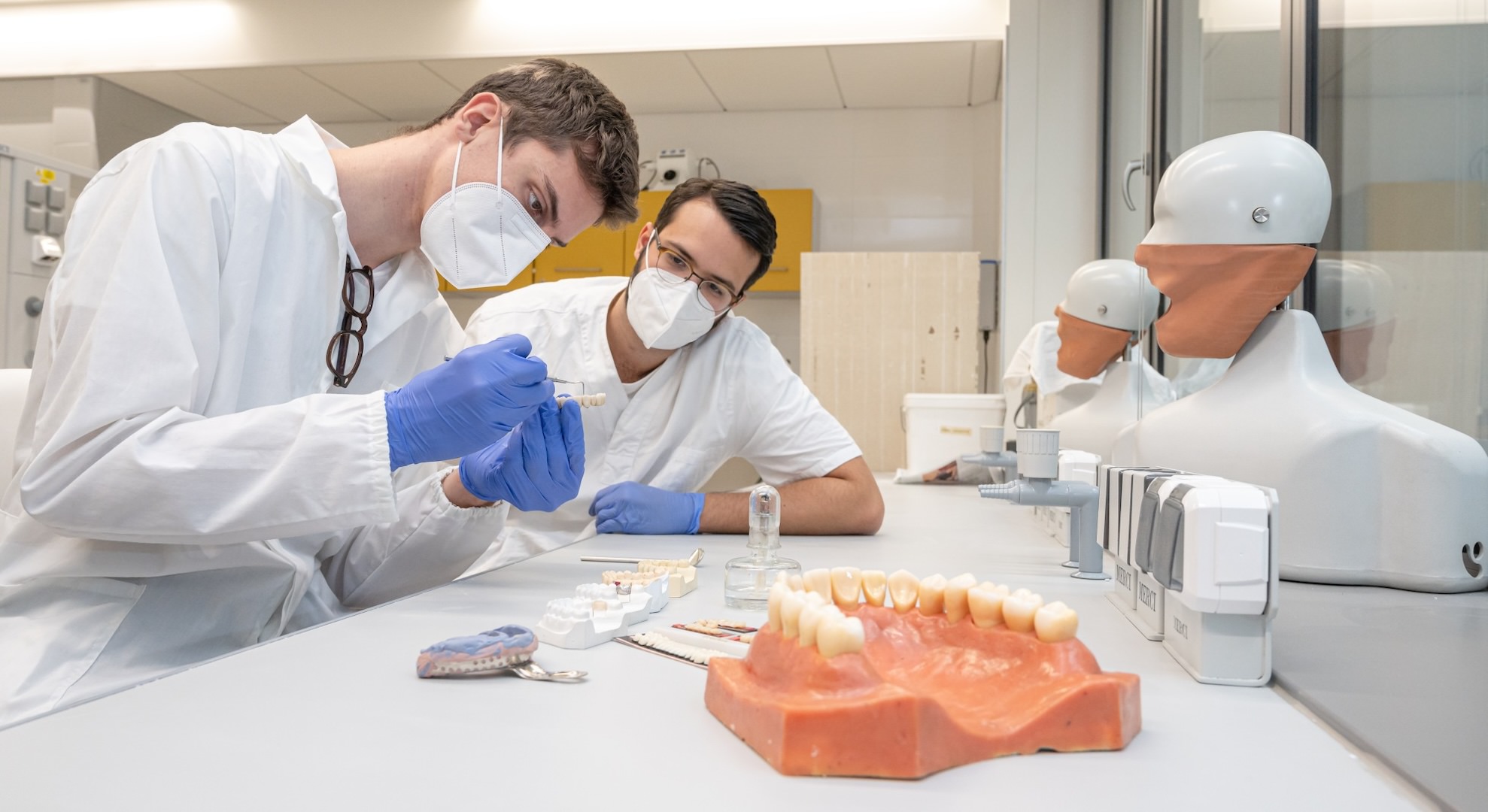
☝️ The most important facts in brief
- The planned duration of the degree programme is 10 semesters.
- After studying dentistry, you will be well trained in the field of dental, oral and maxillofacial medicine and can start your career as a dentist.
- A complete dental degree programme comprises a pre-clinical and a clinical part and concludes with the state examination.
- To gain admission to this degree programme, you need an excellent Abitur and often have to take additional admission tests.
- If you don't get a place to study dentistry in Germany, there are interesting opportunities to realise your dream of working as a dentist by studying in another country.
📖 Table of contents
The degree programme in dentistry prepares future dentists to take care of oral health. It combines the basics of medicine with specialised subjects in dentistry for the prevention and treatment of diseases and concludes with a state examination in accordance with the licensing regulations.
Are you interested in studying dentistry?
We will be happy to advise you on your options free of charge Human medicine or study dentistry. We can also advise you on a Studying medicine abroad (EU), which is fully recognised in Germany.
Is dentistry the right degree programme for you?
The learning curve on the way to becoming a dentist is high. You should therefore have no problem investing a lot of time and energy in learning if you want to study dentistry. As you will have to deal sensitively with people both later as a dentist and during your studies, the corresponding social skills are also required.
While there are also areas of work in human medicine for people with comparatively gross motor skills, there are hardly any in dentistry. You therefore need talent and skill to learn the skills required to maintain healthy teeth and to be able to perform them with good results later on.
Admission requirements for studying dentistry
As a rule, a general higher education entrance qualification or a subject-specific higher education entrance qualification is required for admission to dental medicine. However, as this is a particularly popular degree programme, a formal school-leaving certificate is usually not enough - there is a strong rush of applicants.
A central aspect of the selection process is the Numerus Clausus (NC). Due to the limited number of study places, a very good A-level grade is generally required.
Further selection criteria may be added depending on the university:
TMS (test for medical degree programmes): A good result can improve the weighted Abitur grade. The test is subject to a fee, but is recognised by many universities.
Vocational training or previous experience: For example as a dental technician or dental assistant.
Voluntary work or completed services: Voluntary services or social commitment can be taken into account positively.
Universities' own selection procedures: Each university sets its own priorities - such as practical skills or test performance.
Dexterity tests: Some universities test manual skills, e.g. with the wire bending test. This simulates typical tasks from dentistry and shows how well applicants can work with fine motor skills.
How the dental degree programme works
Dental students have to complete 10 semesters before the final examination. These are divided into two sections, "pre-clinical" and "clinical", each lasting 5 semesters. While the pre-clinical part of the course primarily covers the basic areas of knowledge, the clinical section in particular is characterised by many practical activities. We would now like to take a closer look at the two sections.
First study phase
The first semesters of the dentistry degree programme are known as the preclinical phase. In the first two semesters, you can expect lectures and initial practical exercises that impart basic scientific and medical knowledge.
After the second semester, you will take your first major exam: the pre-physics course. It tests your knowledge in the natural sciences and is a prerequisite for continuing your studies.
Before the pre-physical course, students must also pass numerous tests - these are smaller, subject-specific intermediate examinations that take place regularly during the semester. They are necessary in order to be admitted to the main examination.
Contents of the preclinical programme
The subjects in the pre-clinical part include, among others:
Biology
Chemistry
Macroscopic anatomy
Microscopic anatomy
General physiology
Special physiology
Biochemistry
Molecular biology
After the fifth semester, the pre-clinical section ends with the Physikum. This comprehensive examination includes both theoretical questions and practical examinations in which you must prove that you have the necessary knowledge and skills to move on to the clinical part of the programme.
Second study phase
The clinical part of the dentistry degree programme begins with the second stage of your studies. Now it gets practical - because as a student (often affectionately referred to as "Zahni"), you are allowed to work on real patients for the first time under the guidance of experienced dentists. This phase is crucial for your future career, as this is where you put your theoretical knowledge into practice.
During clinical training, the focus is not only on treatments, but also on deepening medical and dental expertise. The following subjects are central components of this study phase:
Pathology
Orthodontics
Dental, oral and maxillofacial surgery
Dentures
Conservative dentistry
Hygiene
Medical microbiology
Ear, nose and throat medicine
The clinical section ends with the second state examination. This final examination marks the last major milestone of your degree programme. If you pass it, the path is clear for you to practise as a dentist.
State examination and licence to practise - what you need to know
The new Licensing Regulations for Dentists (zApprO) have been in force since the winter semester 2021/22. The second state examination is divided into two parts:
written part
oral part
To be admitted to the examination, you must fulfil the following requirements:
Passing all intermediate examinations
Completion of a one-month nursing service
Proof of first aid training
Participation in a training programme of at least four weeks Famulatur
You will only receive your licence to practise after successfully completing this examination. You are then officially a dentist and can work in practices, clinics or later in your own practice.
Not every dentist has a doctorate
Once you have passed all the examinations for your dental degree, you can pursue a career as a dentist. A doctorate is not required for this, but can improve your salary prospects under certain circumstances. For this reason, many students work on their dissertation before their final examination. Alternatively, it is of course also possible to take up a corresponding position as a doctoral candidate after completing your studies and earn the title with a corresponding thesis.
Study dentistry abroad
Dental medicine degree programmes are in high demand in Germany. As many potential students apply for far too few places, the question quickly arises as to what you can do if you don't get admission to your dream degree programme.
In such a case, one option is to complete your dental training at a foreign EU university. If you are interested, you will find a list of universities abroad where prospective dentists can study in English or even German, as well as further information. As the difference to a degree course completed in Germany is not particularly great, it is possible to obtain a licence to practise as a dentist in Germany after studying abroad by submitting an appropriate application. This means, for example, that a Dental medicine degree programme without NC possible.
One of the best universities for studying dentistry abroad is the Masaryk University in Brno. Here are some impressions:
A lot of material in a short time - mastering the learning stress of studying
For dental students, who are often referred to as "dentists", studying can be very stressful at times. A large amount of material on many different topics has to be mastered in a short space of time.
Good time management is essential to successfully manage the stress of learning. Set priorities depending on the subject and create structured learning plans from the outset. It is equally important to plan regular breaks and make use of support services such as study groups or tutorials to deepen your existing knowledge and acquire new ones.
Various job profiles in dental medicine
Dentistry offers a wide range of exciting career prospects - not just as a traditional dentist. Many people first think of working as a dentist in a practice, but the professional field is much more varied. After successfully completing your dental degree, you can specialise in different directions or embark on new career paths.
Here is an overview of the most important job profiles:
Dentist
Classical work in the diagnosis, prevention and treatment of diseases in the mouth, teeth and jaw area. Depending on your interests, it is possible to set up your own practice or work in clinics.Orthodontist
Specialised dentists who focus on correcting misaligned teeth and jaws - for example with the help of braces, aligners and orthodontic appliances.Oral surgeon
After additional training, oral surgeons perform surgical procedures in the oral cavity, such as the removal of wisdom teeth, implantations or apicoectomies.Dental hygienist
The focus is on professional tooth cleaning, periodontal prophylaxis and advice on optimal oral hygiene for diseases such as periodontitis. Often working in close collaboration with dentists.Prophylaxis assistant
Supports dental work through preventive measures, training patients in proper dental care and carrying out check-ups as a preventive measure.
Each of these specialisations builds on the completed dental degree and in some cases requires additional further or advanced training. Dental medicine is a dynamic fieldin which medical knowledge, technical precision and interpersonal communication work closely together.
How much do you earn as a dentist? An overview of the salary
The earnings of a dentist depend heavily on the speciality in which he or she works. It is therefore not possible to provide generalised information here. In general, you can assume that the salary of dentists employed in a practice or dental clinic is around 3,500 to 4,500 euros per month. Professions that require additional knowledge and qualifications, such as orthodontics, offer a higher salary.
Self-employed dentists who treat their patients in their own practice have significantly higher earnings compared to employed dentists. This averages between €8,000 and €10,000 per month, but can vary greatly depending on the type of practice and specialisation. You also need to bear in mind that self-employment involves considerable costs that need to be factored in.
One of the most frequently asked questions about studying dentistry is: "Is it worth it financially?" The answer is yes - but your future salary depends heavily on where and how you work as a dentist. There are big differences between employed and self-employed work and depending on your specialisation.
Salary as an employed dentist
If you work in a dental practice or dental clinic after your studies, you can generally expect the following gross monthly salary:
approx. 3,500 - 4,500 euros/month
In large cities or with a high degree of specialisation, even more
Professional experience and additional qualifications increase salary
Particularly in areas such as orthodontics or oral surgery, which require additional training, earnings are often above average.
Salary as a self-employed dentist
If you run your own practice, your income is usually significantly higher - but also involves more responsibility. On average, self-employed dentists earn:
approx. 8,000 - 10,000 euros/month
Depending on practice size, location and specialisation, significantly more or less
Income must be offset against running costs (staff, rent, materials, insurance, etc.)
Making sensible use of further training opportunities in dentistry
After successfully completing your dental degree, there are numerous further training options open to you to sharpen your profile, acquire new skills and strategically develop your career. Both specialist specialisations and further academic training are available.
The most popular specialist specialisations include:
Implantology - modern dental implants and surgical procedures
Aesthetic dentistry - focus on the function and aesthetics of the dentition
Periodontology - specialisation in gum disease
Endodontology - treatment of the inside of the tooth, e.g. root canal therapy
These further training courses allow you to develop your own profile in practice and position yourself specifically in areas that are in high demand and require a high degree of specialisation.
You can also gain further academic qualifications:
Postgraduate degree programmes in dental or medical fields
Doctorate (Dr med. dent.) for a scientific career or teaching
Participation in specialist congresses, workshops and seminars
Establishing professional networks to promote the exchange of ideas between colleagues
Continuing education and training ensure that you are always up to date with the latest research and technology - a decisive factor in a rapidly developing speciality such as dentistry.
Alternatives to studying dentistry
There are alternatives for those who are interested in oral health and teeth but do not want to or cannot follow the traditional route of studying dentistry.
Degrees in dental hygiene or dental technology offer practical work with patient contact without the need for a licence to practise dentistry. Furthermore, a degree in health sciences or biomedicine with a focus on oral health opens up exciting career paths in research and development. A Master's degree in healthcare management or similar specialisms also qualifies graduates for management and administrative roles in the healthcare sector, especially in dental facilities. These alternatives can lead to specialised and equally fulfilling career paths.
Free information material
Studying medicine abroad 🎉
Order your info pack now, find out more about the Studying medicine abroad and get started as a medical student!
